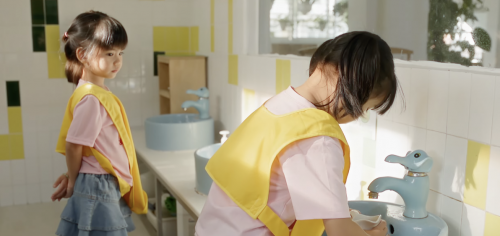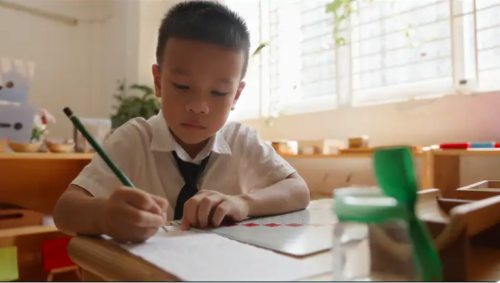Montessori Education Program for Ages 0-3
I. Program Overview
The first three years of life mark a magical journey where children absorb their surroundings like a sponge, taking in every sound, sight, feeling, and experience. This is the period Maria Montessori described as the “Absorbent Mind,” where everything a child encounters serves as the foundation for their long-term physical, intellectual, and emotional development.
In the Montessori program, the environment is more than just a place for learning—it is a space filled with love and respect. Here, children are encouraged to explore and develop in their own unique ways, with unwavering respect for their individuality. Every element, from small tables and low chairs to carefully designed materials, conveys the empowering message: “You can do it!”
Free from the pressure of comparison or coercion, children learn at their own pace in a safe, stimulating environment. The joy of completing small tasks—such as putting on a jacket or tidying up toys—becomes a driving force for children to confidently engage with the larger world.
II. The Infant Community: Building Early Connections
The Montessori classroom for children aged 0-3, known as the “Infant Community,” is the first space outside the home where children experience belonging to a larger community. It is here that they begin their social journey, learning to connect with peers, understand their role within a group, and find joy in contributing.
Each day in the classroom is filled with meaningful experiences. Children are encouraged to care for themselves, from dressing to washing hands to tidying personal belongings. Beyond self-care, they also learn to care for their environment and show kindness to others. Simple acts like sharing toys, helping a friend clean a table, or offering a smile help children understand their value in a community.
These seemingly small lessons carry significant meaning. Children feel safe, loved, and valued as their actions bring joy to others. The classroom becomes a second family, where children receive genuine encouragement to develop their early social skills.
III. Areas of Learning in the Montessori Environment
1. Practical Life: Independence Through Small Actions
The Practical Life area is where children learn to perform everyday tasks independently. Activities such as pouring water, folding napkins, wiping tables, and dressing themselves are performed with focus and joy. Moments like putting on a jacket or cleaning up after a meal not only develop motor skills but also instill a sense of pride in their growing independence.
These lessons are designed not just to enhance dexterity but also to cultivate patience, orderliness, and the ability to self-correct. Children learn polite behavior and graceful movements, preparing them for social and cultural interactions in the future.
2. Language: Opening the Door to Communication
The 0-3 age range is a golden period for language development. Montessori creates a rich environment where children explore and acquire language naturally. Activities like using picture cards, reading books, listening to stories, and learning words through real-life objects expand vocabulary and expressive abilities.
More than just acquiring language, children are encouraged to articulate their thoughts and feelings. The sparkle in their eyes as they name a new object or retell a story is a testament to their progress and confidence. These activities lay a strong foundation for communication and critical thinking in the future.
3. Art and Music: Nurturing Emotion and Creativity
Art and music are essential elements of the Montessori program, where children are free to express their emotions and develop creativity. Gentle melodies, simple instruments like tambourines and drums, as well as activities like drawing and coloring, help children explore their inner world and expand their imagination.
This space is free from judgment or comparison. Instead, it offers joy, freedom, and encouragement. Art and music not only provide entertainment but also teach children that their emotions are valuable and worthy of expression.
4. Sensory Exploration: Discovering the World Through Senses
From birth to age three, children use their hands and senses to explore the world. Montessori offers specialized materials like color tablets, geometric solids, and tactile objects to help children refine their sensory perception.
Children also engage in gross motor activities like climbing and running, which develop balance and physical coordination. These exercises bring joy and support the development of focus, patience, and fine motor skills.
The Montessori Environment: A World of Love and Learning
The Montessori program for children aged 0-3 is more than just a learning environment—it is a world filled with love, where children are valued and encouraged to grow holistically. Each moment in this space is an opportunity for children to develop independence, confidence, and the joy of exploring the world in their own way.
With gentle guidance, the Montessori environment nurtures a spirit of independence, creativity, and social connection—essential elements that prepare children to step into the future with confidence and a strong foundation for lifelong development.
Sincerely,
Tiny Flower Montessori
Others:





